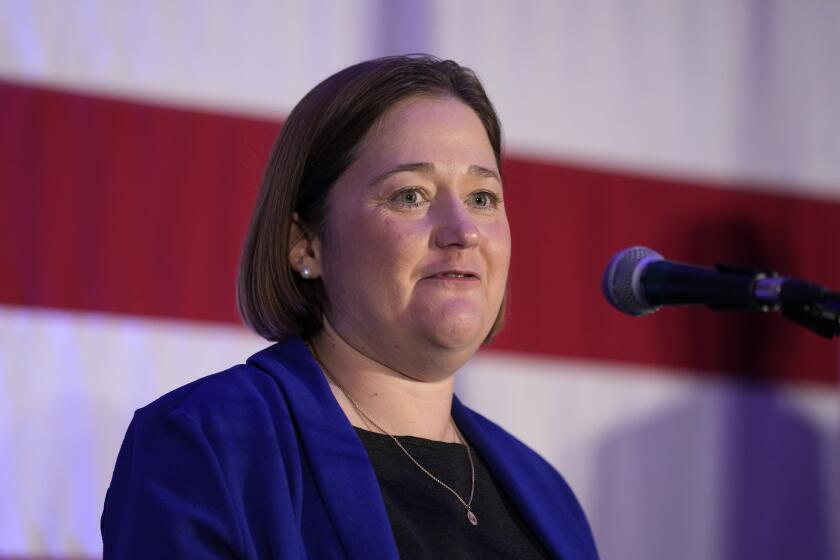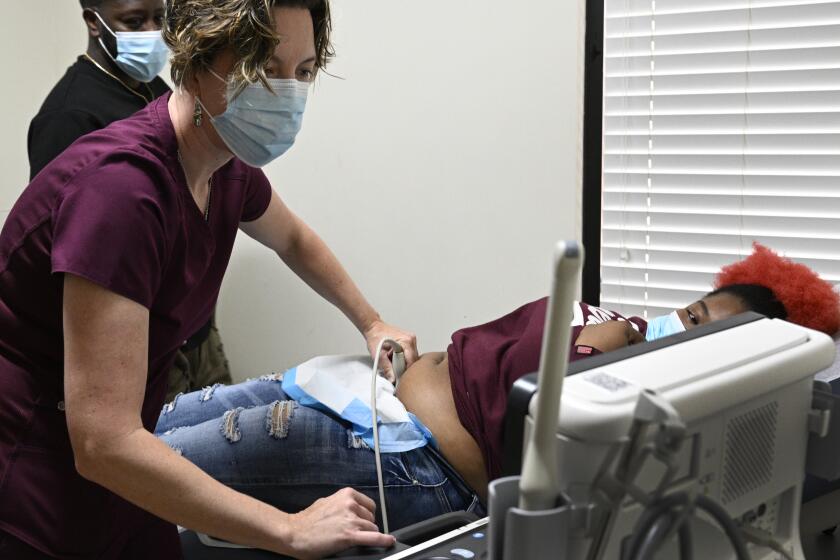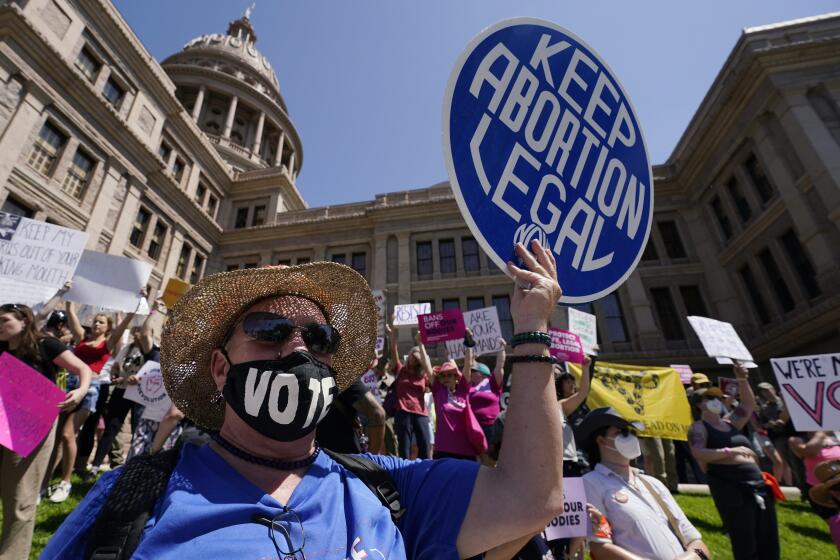In rare 3-3 vote, Iowa Supreme Court declines to reinstate law banning most abortions

- Share via
DES MOINES — Abortion will remain legal in Iowa after the state’s high court declined Friday to reinstate a law that would have largely banned the procedure, rebuffing Republican Gov. Kim Reynolds and, for now, keeping the conservative state from joining others with strict abortion limits.
In a rare 3-3 split decision, the Iowa Supreme Court upheld a 2019 district court ruling that blocked the law. The latest ruling comes about a year after the same body — and the U.S. Supreme Court — determined that women do not have a fundamental constitutional right to abortion.
The blocked law would ban abortions once cardiac activity can be detected, usually around six weeks of pregnancy and before many women know they are pregnant. The law contains exceptions for medical emergencies, rape, incest and fetal abnormality.
Writing for the three justices who denied the state’s request to reinstate the law, Justice Thomas Waterman said granting the request would mean bypassing the Legislature, changing the standard for how the court reviews laws and then dissolving an injunction enacted by a lower court that blocked the law.
“In our view it is legislating from the bench to take a statute that was moribund when it was enacted and has been enjoined for four years and then to put it in effect,” Waterman wrote.
Reynolds signed the 2018 law despite state and federal court decisions at the time, including Roe vs. Wade, affirming a woman’s constitutional right to abortion. Planned Parenthood sued, and a state judge blocked the law the following year. Reynolds did not appeal the decision at the time.
In a separate case, the Iowa Supreme Court decided last year to reverse an opinion saying the state’s constitution affirms a fundamental right to abortion. Roe was overturned a week later, and Reynolds sought to dissolve the 2019 decision.
The Iowa attorney general’s office has paused its practice of paying for emergency contraception, and in rare cases abortions, for victims of sexual assault.
A state judge ruled last year that she had no authority to do so, and Reynolds appealed to the Iowa Supreme Court.
The court has seven members, but one justice declined to participate because her former law firm had represented an abortion provider. All of the justices were appointed by Republican governors and five were appointed by Reynolds, who expressed disappointment in the court’s ruling.
“Not only does it disregard Iowa voters who elected representatives willing to stand up for the rights of unborn children, but it has sided with a single judge in a single county who struck down Iowa’s legislation based on principles that now have been flat-out rejected by the U.S. Supreme Court,” Reynolds said in a statement.
Reynolds added that “the fight is not over.” Republicans hold large majorities in the Iowa House and Senate, and leaders of both chambers suggested they would work toward passing new legislation.
Ruth Richardson, president and chief executive of Planned Parenthood North Central States, called the decision “an enormous win.”
“Each person deserves control of their body, and Iowans have that right, based on today’s court decision,” she said in a statement. “Abortion bans make pregnancy more dangerous than it already is, and it shouldn’t matter which state you live in.”
A former abortion clinic in Alabama evolves amid bans on caring for uninsured patients and offering post-miscarriage treatment and transgender care.
Although the state’s high court maintains the block on the law, it does not preclude Reynolds and lawmakers from passing a new law that looks the same. The decision Friday was largely procedural — the 2022 appeal to the 2019 ruling was too late. Abortions remain legal in Iowa up to 20 weeks of pregnancy.
Most Republican-led states have severely curtailed access to abortion in the year since the U.S. Supreme Court stripped women’s constitutional right to abortion by overturning Roe vs. Wade and handing authority over the issue to states.
Courts have put enforcement of several abortion bans and restrictions on hold while they consider whether they comply with state constitutions. Six are currently paused, but there have been final rulings in a handful of cases since Roe’s reversal — and no clear trend on how they’re going.
A state appeals court ruled last year that an abortion ban dating to before Arizona was a state does not apply to doctors, but whether it applies to other “helpers” is part of an ongoing legal dispute. The South Carolina Supreme Court this year struck down a ban on abortions after cardiac activity can be detected. Since then, the state has adopted a new ban, though enforcement of it has been paused by a court.
Judges in some other states have found bans unconstitutional only in narrow ways.
Five women who said they were denied abortions even when pregnancy endangered their lives are suing Texas over its abortion ban.
The top court in Oklahoma last month struck two state laws banning abortion, but the procedure remains illegal there, with some exceptions, because another ban remains in effect.
A federal judge last year barred Idaho from enforcing its abortion ban in medical emergencies just after another federal judge made the opposite call on a Texas law.
More to Read
Get the L.A. Times Politics newsletter
Deeply reported insights into legislation, politics and policy from Sacramento, Washington and beyond. In your inbox twice per week.
You may occasionally receive promotional content from the Los Angeles Times.













